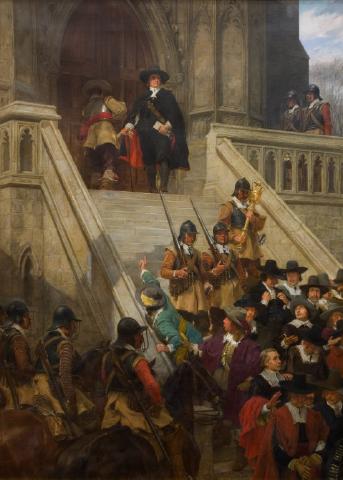
Word of the Day: Redoubtable
Today’s word of the day comes from Infoplease.com, and it redoubtable. Redoubtable is an adjective meaning “that is to be feared; formidable,” or “commanding or evoking respect, reverence, or the like” (https://www.infoplease.com/wordoftheday?type=choosed&opt=2). According to www.etymonline.com, the word enters English “late 14c., from Old French redoutable (12c.), from redouter ‘to dread,’ from re-, intensive prefix, + douter ‘be afraid of.’” The root of redoubtable is, obviously, doubt. Doubt enters the language, according to etymonline.com, “c. 1200, douten, duten, ‘to dread, fear, be afraid’ (a sense now obsolete), from Old French doter ‘doubt, be doubtful; be afraid,’ from Latin dubitare ‘to doubt, question, hesitate, waver in opinion’ (related to dubius ‘uncertain’), from duo ‘two’ (from PIE root *dwo- ‘two’), with a sense of ‘of two minds, undecided between two things.’” Notice that the French, like the Middle English, does not have the b, but during the English Renaissance, classical scholars decided that, since the Latin root word has a b, the word would be more properly spelled with it even though nobody in the history of the English language has ever tried to pronounce doubt with the b sound. If you ever wondered why English has silent letters, you can blame, partly, Latin scholars.
On this day in 1648, Pride’s purge began.
Here’s the background. The English Civil War began in 1642, pitting the Puritan Parliament against King Charles I, who believed that the king was divinely ordained to rule. By 1648, King Charles had been captured, and the leaders of Parliament, called the “grandees,” had been trying to negotiate with the king to resolve their differences, but it was hard. The Parliament had different factions, and Charles tried to play one faction against the other, which delayed any progress. Then Charles escaped, and the Civil War was re-engaged, until Charles was recaptured. While the army felt that Charles could not be trusted, a majority of the Parliament still supported Charles to some extent.
So on this date in 1648, Colonel Thomas Pride stationed his troops on the steps leading up to the House and, using a list he had been provided with, and with the help of one Lord Grey, he arrested Members of Parliament (MPs) who disagreed with the Grandees. From a Parliament that had over 500 eligible seats, the Purge had cut the number to nearly 200, a Parliament that would later be called the Rump Parliament. And with the diminished number of members, the Grandees had a majority. With that majority, they were able to put Charles on trial for treason, and on January 30, 1649, Charles was beheaded.
In February of 1660, Parliament reversed Pride’s Purge and restored to Parliament all the members who had been barred (and who were still alive). This restored Parliament then voted its own dissolution, and when a new Parliament was formed, it restored the monarchy and invited Charles II to return from his exile in France and claim his father’s throne.
In the meantime, for 11 years England was without a king, and the people had endured a severe restriction on their rights (though not that much more severe than they had endured under Charles I). And just 28 years later, the English would rebel against Charles’s brother James II, driving him from the kingdom, and inviting in William of Orange and his wife, Mary.
Throughout human history, men have stood up and claimed authority over others. Some of those men were kings, and some were military leaders like Pride or Oliver Cromwell, and some were just thugs. They all thought, and think, that they can scare the rest of us into submission, into doing their will. They think they are and deserve to be feared and respected.
But the human spirit, the desire for freedom, is what is truly redoubtable.
The image comes from the following website: https://lostcityoflondon.co.uk/2018/12/06/prides-purge-1648/.